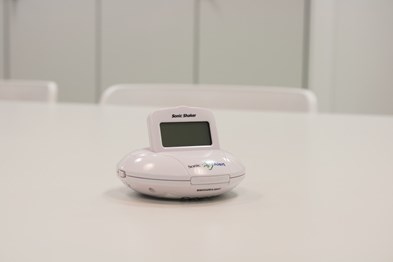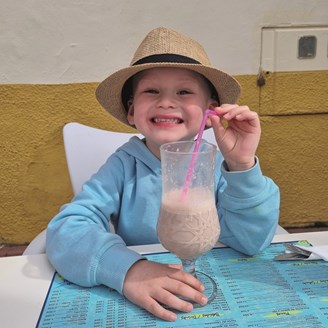Sun, sea and technology
The summer is an exciting time for many children, especially if a holiday is planned. However, it can be difficult to know what to pack to make sure your child has everything they need with them when staying away from home.
Batteries
- It’s important to pack extra batteries, especially when going abroad. Contact your audiologist or battery dispenser if you need additional batteries for your child’s hearing device.
- Some modern hearing devices use rechargeable batteries. Make sure all batteries are fully charged and that you take the charger with you, along with the correct travel adaptor for countries overseas.
Hearing devices
- If your child is implanted with a cochlear implant or bone conduction hearing implant, and you’ll be going through security at the airport, take a medical identification card with you. Alternatively, contact the hospital for a letter to explain the hearing device to airport security staff. Be sure to have a translation of the letter in the correct language for wherever you’re visiting to make sure there’s clear communication on return.
- Contact your child’s cochlear implant centre or manufacturer well in advance of your holiday to request a loan kit. These provide spare processors in case they’re lost or damaged whilst you’re away. Please note that a fee may apply to get a holiday loan kit.
- Advanced Bionics (AB): 01223 847888 or [email protected]
- Cochlear: 01932 263640 or [email protected]
- MED-EL: 03301 235601 or [email protected]
- Make sure your child’s hearing devices, including any loan kits, are covered by your travel insurance, as hearing devices can be very costly to replace or repair.

Travelling with technology
- Take a portable alarm clock with you – these are usually battery-powered and take up little room in your luggage. The vibrations are typically stronger than a phone alarm, so your child won’t have to worry about missing booked flights or planned excursions.
- Headphones and streamers can be used by your child to privately listen to music or watch movies on long journeys, without disturbing other holidaymakers. Most modern hearing devices have Bluetooth connectivity, so you might not need headphones or a streamer.
- In-flight entertainment doesn’t always have subtitles, so you may wish to download your child’s favourite movies and programmes onto a tablet before the holiday to help pass the time during the journey.
Swimming
- If your child loves swimming, make sure you take some waterproof covers for their cochlear implants. These are available for Advanced Bionics (AB), Cochlear and MED-EL models. Find out more about keeping hearing technology safe around water.
- Take a drying box for your hearing device to collect any excess moisture while playing in or near a swimming pool or the sea. This can be a simple container with a drying tablet or an electronic drying box. Remember to take the appropriate adaptor plug to be able to use them abroad.
- If your child removes their hearing devices to avoid losing them or getting them wet, it’s useful to agree on some basic signs to help with communication, such as ‘Are you OK?’, ‘Do you want a drink?’ or ‘Are you too hot?’
Packing
Don’t forget to add the following to your usual holiday packing list!
- Extra batteries
- Battery charger
- Travel plug adaptor
- Medical identification card/letter from the hospital and translation
- Cochlear implant holiday loan kit
- Vibrating alarm clock
- Headphones/streamers
- Tablet with downloaded films and TV programmes with subtitles
- Waterproof covers for cochlear implants
- Drying box
Becky’s travelling tips

Becky, mum to Kenzie (5) who’s profoundly deaf, has shared her tips for going on holiday with a deaf child.
- Declare your child’s hearing loss when booking flights. This can give you special assistance, which may include assisted boarding and access to quieter areas of the airport.
- If your child is a cochlear implant user, they don’t have to go through the body scanner in security. Instead, they can be taken to one side and have a traditional security pat-down.
- The airline should allow free extra hand luggage on the plane for medical equipment, such as any cochlear implant holiday loan kits that you may have organised for peace of mind.
- Sometimes, the excess noise on a plane can be overwhelming for a deaf child. Allow them to remove their hearing devices if they’re feeling uncomfortable or upset.
- Most cochlear implants have waterproof covers so that your child can continue wearing them in water. However, it’s useful to take a drying box with you to be on the safe side.
- If you’re going to an amusement park, such as Disneyland, arrange to get a Priority Card. This can help to bypass the long and noisy queues and allow quick access to the rides.
Summer 2023 Families magazine
